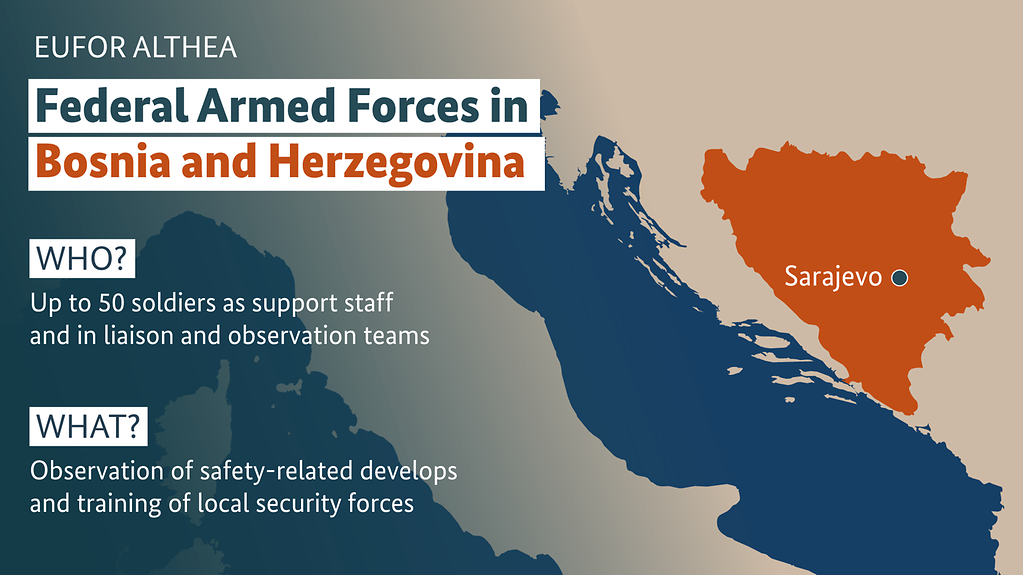Deployment extended
The Federal Armed Forces will continue to participate in the EUFOR ALTHEA operation in Bosnia and Herzegovina. The Federal Cabinet has extended the mandate to the end of June 2024. The Bundestag still has to agree to the resolution.
2 min reading time

The Federal Armed Forces previously deployed liaison and observation teams during Germany’s previous involvement from 2004 to 2012.
The graphic is entitled “Federal Armed Forces in Bosnia and Herzegovina”, and the caption says "Who? Up to 50 soldiers in staff, liaison and observation units; below that it says: "What? Monitoring security-relevant developments in addition to on-site training for the security forces."
Photo: Federal Government
By continuing its participation in EUFOR ALTHEA, the Federal Government is underlining its ongoing commitment to security and stability in the Western Balkans and the necessary reforms for Bosnia and Herzegovina to prepare themselves for a potential integration into the EU.
Continuing threat to the stability of the Western Balkans
The reason for the renewed participation in the EUFOR ALTHEA mission is the current political development in Bosnia and Herzegovina. Ethnic divisions between Bosnians and Bosnian Croats on the one hand and, on the other, Bosnian Serbs are ever-present, which dominates the political arena and blocks progress and reform processes. The purpose of the EUFOR ALTHEA operation is to maintain a safe and secure environment in the region in line with the Dayton Peace Agreement, which ended the Bosnian war in 1995.
Given the political tensions in the region, Germany's engagement is a clear commitment to the sustainable stabilisation of Bosnia and Herzegovina. The EUFOR ALTHEA operation continues to be essential as a guarantor of stability in the country.
Joint training with the local security forces
EUFOR ALTHEA monitors security-related developments in Bosnia and Herzegovina and is the major training and cooperation partner of the national security authorities. Joint training with local security forces improves their ability to contribute to future international cooperation. Liaison and observation bases spread throughout the country ensure an additional visible presence at the local level, whilst also facilitating dialogue with the civilian population. In addition, the soldiers ensure that local residents are aware of the dangers posed by contaminated ammunition and provide support in dealing with the effects of the civil war. As has been the case so far, up to 50 soldiers may be deployed and the multinational EUFOR ALTHEA battalion is capable of responding to threat scenarios, which means that it makes a significant contribution to the High Representative's freedom of action and ability to implement the relevant mandate. In addition to supporting the security forces in Bosnia and Herzegovina, the EUFOR ALTHEA forces are also involved in non-proliferation, demilitarisation, and removing land mines in the country and have made considerable progress so far.
The EUFOR ALTHEA mission is also the only operation being conducted within the framework of the EU's Common Security and Defence Policy (CSDP), which is based on the 2003 "Berlin Plus" treaty between the EU and NATO, which underscores the practical cooperation between the two organisations.